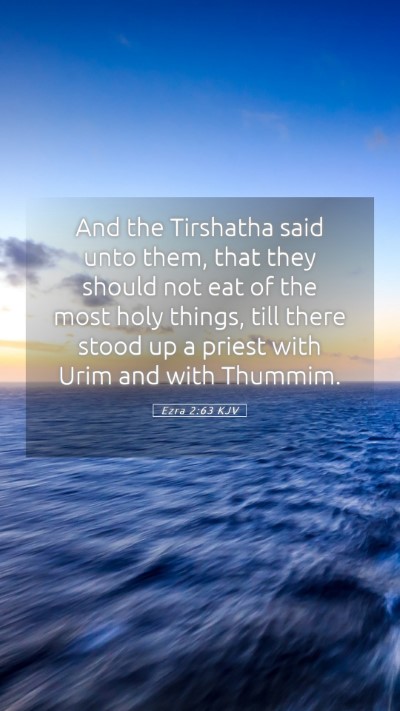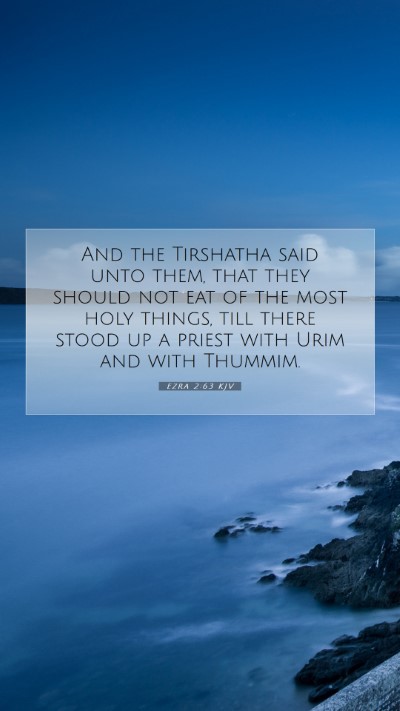Bible Verse Commentary on Ezra 2:63
Bible Verse: Ezra 2:63
This verse reads: “And the governor said unto them, that they should not eat of the most holy things, till there stood up a priest with Urim and Thummim.”
Understanding Scripture: Overview
Ezra 2:63 is a crucial passage that highlights the significance of priestly authority in Israel's religious practices. Understanding this verse requires careful attention to the historical context in which it was written and how it connects to the broader narrative of Israel's restoration.
Contextual Significance
The return of the exiles from Babylon marks a pivotal moment in Jewish history. After years of captivity, the people were enthusiastic about rebuilding the temple and reestablishing their worship. However, this enthusiasm required obedience to the laws governing worship, primarily orchestrated by the priests.
Insights from Public Domain Commentaries
Matthew Henry's Commentary
Matthew Henry emphasizes the importance of the priesthood, noting that the Urim and Thummim were tools used by the high priest to discern the will of God. This highlights the necessity of divine guidance in communal worship and decision-making. Henry suggests that without a priest to mediate, the people are restricted from consuming the most sacred offerings.
Albert Barnes' Notes on the Bible
Albert Barnes provides a detailed explanation of the Urim and Thummim, stating they were likely a form of divination associated with the priestly role. He underscores the gravity of eating the most holy things without proper authorization, insinuating the risk of impiety. The verse establishes the principle that divine instruction must precede actions related to worship.
Adam Clarke's Commentary
Adam Clarke discusses the historical implications of the verse, noting that the absence of a confirmed priest would create disorder in religious practices. He posits that this stipulation served to maintain reverence and order within the community, ensuring that everything pertaining to sacred duties was handled appropriately.
Key Themes in Ezra 2:63
- The Role of the Priest: The priest acts as a mediator between God and the people, underscoring the significance of authority in worship.
- Divine Guidance: The Urim and Thummim symbolize the need for God's direction in significant decisions, emphasizing spiritual discernment.
- Holiness and Reverence: The verse reflects the importance of approaching sacred practices with due reverence and adherence to divine instructions.
Application of Bible Verse
In modern contexts, Ezra 2:63 serves as a reminder of the necessity of spiritual leadership and the importance of seeking divine guidance in decision-making. For individuals and communities today, it invites a reflection on how we conduct our religious practices and the authority under which we operate.
Related Bible Cross References
- Leviticus 10:3 - Discusses the holiness required by those who serve before God.
- Deuteronomy 33:8-10 - Explains the priestly role and its responsibilities among the tribes of Israel.
- Numbers 27:21 - Mentions the importance of seeking counsel from the priest.
Conclusion
Ezra 2:63 illustrates the intricate relationship between worship, authority, and divine guidance within the context of Ancient Israel. Understanding this verse enriches our comprehension of Bible verse meanings and allows for deeper spiritual reflection in our lives today. Emphasizing the need for biblical exegesis and scripture analysis aids readers in grasping not just the text, but also its practical implications for modern worship and decision-making.


